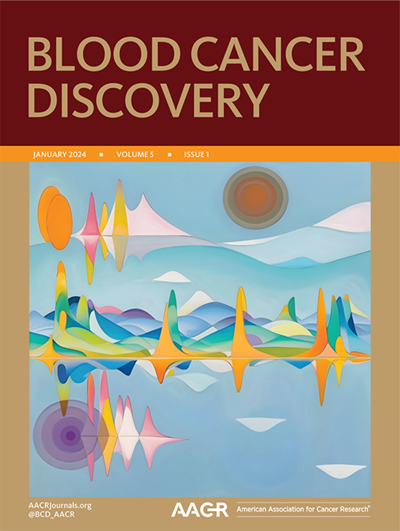了解抗BCMA双特异性抗体的感染风险。
IF 11.5
Q1 HEMATOLOGY
引用次数: 0
摘要
总结:Lanchman及其同事发现,使用抗BCMA双特异性抗体治疗复发/难治性多发性骨髓瘤的患者的感染风险与严重的免疫球蛋白缺乏有关,可以通过免疫球蛋白替代疗法减轻。这项研究对管理感染风险有意义,并对这些有效的新型免疫疗法的最佳治疗时间提出了疑问。参见Lanchman等人的相关文章(4)。本文章由计算机程序翻译,如有差异,请以英文原文为准。
Understanding Infection Risk with Anti-BCMA Bispecific Antibodies.
Summary: Lancman and colleagues find that infection risk in patients treated with anti-BCMA bispecific antibodies for relapsed/refractory multiple myeloma is associated with severe immunoglobulin deficiency and may be mitigated by immunoglobulin replacement therapy. The study has implications for managing infection risk and raises questions about the optimal duration of treatment with these potent, novel immunotherapies. See related article by Lancman et al., p. 440 (4) .
求助全文
通过发布文献求助,成功后即可免费获取论文全文。
去求助
来源期刊

Blood Cancer Discovery
Multiple-
CiteScore
12.70
自引率
1.80%
发文量
139
期刊介绍:
The journal Blood Cancer Discovery publishes high-quality Research Articles and Briefs that focus on major advances in basic, translational, and clinical research of leukemia, lymphoma, myeloma, and associated diseases. The topics covered include molecular and cellular features of pathogenesis, therapy response and relapse, transcriptional circuits, stem cells, differentiation, microenvironment, metabolism, immunity, mutagenesis, and clonal evolution. These subjects are investigated in both animal disease models and high-dimensional clinical data landscapes.
The journal also welcomes submissions on new pharmacological, biological, and living cell therapies, as well as new diagnostic tools. They are interested in prognostic, diagnostic, and pharmacodynamic biomarkers, and computational and machine learning approaches to personalized medicine. The scope of submissions ranges from preclinical proof of concept to clinical trials and real-world evidence.
Blood Cancer Discovery serves as a forum for diverse ideas that shape future research directions in hematooncology. In addition to Research Articles and Briefs, the journal also publishes Reviews, Perspectives, and Commentaries on topics of broad interest in the field.
 求助内容:
求助内容: 应助结果提醒方式:
应助结果提醒方式:


